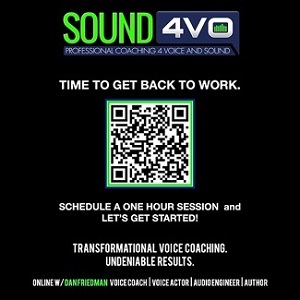|
PART 1 Voice Over Agents: What They Do, And How To Find And Work With Them December 3, 2014  By Rachel Fulginiti By Rachel FulginitiVoice Actor Today kicks off a series about voice over agents: what they do, how to get one and how to work with one once you're in partnership. It's a subject that can often seem mysterious or be frustrating. And sometimes, obtaining agents is a challenging part of getting "to the next level" in your career. But it doesn't have to be confusing! Let's get started. WHAT'S AN AGENT DO? What exactly does an agent do? Well, the short and sweet is: they negotiate contracts. Legend has it, there was once a day when they sought out budding young talent with potential and cultivated it ... but that doesnít happen much anymore. Basically, you and your agent are part of a team. You come to the table a completely formed product, and then your agent (hopefully) helps to sell it. Ideally, your agent(s) find lots of opportunities for you, they talk you up, push for you and go to bat for you. And when you book jobs, they get you the very best deal they can, which will be mutually beneficial for both of you, since they earn 10% of what you make. With union jobs, that 10% is typically added to the top of your rate, so the agentís cut doesnít actually take away from what youíre making on the gig. DIFFERENT FROM A MANAGER? Wait, how are agents different from managers? Technically, to be considered an agent (at least in the state of California), an agent must have a license, adhere to certain guidelines and practices, and can only take a 10% commission. On the other hand, there are no requirements for one to be called a manager. Donít get me wrong, there are great managers out there, and typically they get more involved in the day-to-day career of the talent (or at least, they used to). But beware. There are also many unscrupulous "managers," too. as well. Most managers take a 15 to 20% commission. Many times they will add an additional percentage onto the client's bill and still (also) take 15-20% out of your cut. That being said, if they are obtaining work for you that you wouldnít have otherwise, then itís probably still worth it. NEED AGENTS TODAY? Do you really need agents in today's voice over business? It used to be that if you didnít have an agent, you couldnít be in the game. Prior to the Internet era, voice over was a closed circuit; you needed agents to get auditions (and hence, jobs). These days, with the explosion of online casting and home studios, you donít really need an agent to be a full-time voice actor. But you probably want one anyway. Or more than one. Yes, probably many more than one. For example, I work with my main agent here in Los Angeles, but I also have agents in Chicago, Atlanta and San Francisco. AGENTS PROVIDE ACCESS The thing about having agents is that they get you access to jobs you wouldnít otherwise have access to. Union jobs. Higher paying jobs. Higher profile jobs. So it depends on what you want. If you are content to hustle for all your work, you might not need an agent. I know lots of great talent throughout the country want donít have an agent, and they do really well. But for me personally, itís a crucial part of an overall strategy. While Iím out generating my own work, I also appreciate having someone looking out for and delivering me opportunities. I want a shot at the Cadillac jobs. WHEN TO SEEK AGENTS ... When should you start looking for an agent? As mentioned earlier, you need to come to the table as a complete package. You should:
The way you prove that to them is by telling them about the work you are already doing. See Part 2 - How To Get An Agent -------------------------- ABOUT RACHEL Rachel Fulginiti is a voice actor, audiobook narrator and blogger living in Los Angeles. Sheís represented by William Morris Endeavor and has voiced for hundreds of brands including McDonalds, Kia, Fox, Chrysler, Apple and Target. Email: fulginitivo@gmail.com Web: http://rachelfulginiti.com Blog: http://fulginitivo.com/rachel-has-spoken |
|
|
Inspiring interviews help your VO career
Email alerts to new VoiceOverXtra articles
For essential voice-over business strategies
On Michael Langsner's Voice-Over Roadmap Podcast
As of the NEW website launch, 03/22/2012










Your article is interesting in various respects but misleading in one respect. You state that "if they [managers] are obtaining work for you that you wouldnít have otherwise, then itís probably still worth it." In fact, in California, with essentially one exception, the Labor Code specifies that only licensed agents may procure work for artists. Managers who are not also licensed agents but who nonetheless procure employment for artists are thus in violation of the law, and can be required to disgorge all commissions they have earned. Accordingly, while it is well known that it is not uncommon for managers to procure work in spite of the legal prohibition, the reality is that there is substantial risk in doing so. There are a number of court decisions and continuing controversy about this subject, but thus far this statute is still on the books and it is enforced. (I'm a long-time attorney and aspiring VO actor, with an agent, though I haven't given up my day job!)
Just read your article. Very helpful.
I too am a working voice over artist from Detroit, MI
Love your sound!
I also love your beautiful Italian name. My maiden name is Di Iorio.
Ahh, Italian names are so musical.
All the best bella,
Liz Somerville
lizsomerville.com
Looking forward to parts 2 and 3